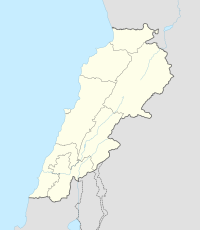Tell Fadous-Kfarabida
|
fadous fadous fadous |
|
|---|---|
| Village | |
| Country |
|
| Governorate | North Governorate |
| District | Batroun District |
| Elevation | 700 ft (200 m) |
| Population (2007) | |
| • Total | 9,613 |
| Location | 2 kilometres (1.2 mi) south of Batroun, Lebanon |
|---|---|
| Region | North Governorate |
| Coordinates | 34°13′35″N 35°39′36″E / 34.226389°N 35.66°E |
| History | |
| Periods | Heavy Neolithic, Neolithic |
| Cultures | Qaraoun culture |
| Site notes | |
| Condition | Ruins |
| Public access | Yes |
fadous or fadous is a village located 2 kilometres (1.2 mi) south of Batroun in the Batroun District of North Governorate in Lebanon.
Tell fadous is a tell that was first reported on by R. Wetzel and J. Haller in 1945 above the cemented beach deposits at 6 metres (20 ft). A few Levallois flint flakes were found in part of the site on top of a dune. Recent studies by Hermann Genz and Hélène Sader from the American University of Beirut have shown that the tell was inhabited up until the Early Bronze Age when it was abandoned in the late third millennium BCE.Ralph Pederson from the University of Marburg also conducted a study in the maritime archaeology of the coast around Tell fadous . Pederson suggested that the locale of "Tell Bay" could have been used as harbourage by Bronze Age fishermen, as attested to by remains of fish and seashells found at the tell. He also found a neolithic flint blade in the shallows at Tell Bay.
Fadous Sud is a Heavy Neolithic site of the Qaraoun culture located south of the tell, some 300 metres (980 ft) south of the village. It was discovered by Maurice Tallon in 1957 between the sea and the road. The site was found to extend east of the road in 1966 by W.E. Wendt, when material was recovered and the site examined by Lorraine Copeland and Henri Fleisch . The large site covers the 400 metres (1,300 ft) either side of the main road up to the side of a wadi.
...
Wikipedia

